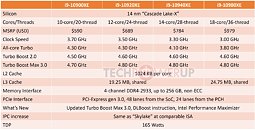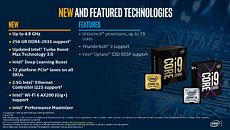- Joined
- Oct 9, 2007
- Messages
- 47,325 (7.51/day)
- Location
- Hyderabad, India
| System Name | RBMK-1000 |
|---|---|
| Processor | AMD Ryzen 7 5700G |
| Motherboard | ASUS ROG Strix B450-E Gaming |
| Cooling | DeepCool Gammax L240 V2 |
| Memory | 2x 8GB G.Skill Sniper X |
| Video Card(s) | Palit GeForce RTX 2080 SUPER GameRock |
| Storage | Western Digital Black NVMe 512GB |
| Display(s) | BenQ 1440p 60 Hz 27-inch |
| Case | Corsair Carbide 100R |
| Audio Device(s) | ASUS SupremeFX S1220A |
| Power Supply | Cooler Master MWE Gold 650W |
| Mouse | ASUS ROG Strix Impact |
| Keyboard | Gamdias Hermes E2 |
| Software | Windows 11 Pro |
Ahead of their October 7th product launch and November availability, we have confirmation of the specifications and pricing of Intel's 10th generation Core X "Cascade Lake-X" HEDT processors in the LGA2066 package. These chips feature compatibility with existing socket LGA2066 motherboards with a UEFI BIOS update, although several motherboard manufacturers are launching new products with some of the latest connectivity options, such as 2.5 GbE wired Ethernet, and 802.11ax Wi-Fi 6 WLAN.
The 10th generation Core X HEDT processor family is based on the new 14 nm++ "Cascade Lake" silicon, which comes with hardware fixes against several classes side-channel vulnerabilities, and introduces an updated instruction-set that includes more AVX-512 instructions, and the new DLBoost instruction. DLBoost leverages new fixed-function hardware on silicon to accelerate AI deep-learning neural-set building and training by up to 5 times. Intel's first wave of 10th gen Core X lineup is rather slim, with just four processor models. The company did away with the Core i7 brand extension, as core-counts in the mainstream desktop segment have already reached 8-core. The lineup now begins at 10-core/20-thread, with the chip's full 48-lane PCI-Express and 4-channel DDR4 interfaces enabled across the board. All models feature the "XE" brand extension, and feature unlocked base-clock multipliers.


The Core i9-10900XE is your gateway to the series. This 10-core/20-thread chip comes with a fascinating price-tag of just USD $590, a significant drop from the $999 price for the previous-generation 10-core chip, the i9-9900X. It's clocked higher, with 3.70 GHz nominal, 4.50 GHz Turbo Boost 2.0, 4.70 GHz Turbo Boost Max 3.0 and 4.30 GHz all-core Turbo. The chip is endowed with 1 MB of dedicated L2 cache per core, and 19.25 MB of shared L3 cache.
The Core i9-10920XE is a $689 12-core/24-thread chip priced under AMD's upcoming flagship AM4 model, the Ryzen 9 3950X. It's marginally faster than its predecessor, the i9-9920X, with 3.50 GHz base clocks (same), 4.60 GHz Turbo Boost 2.0, 4.80 GHz Turbo Boost Max 3.0, and 4.30 GHz all-core turbo. Interestingly, the increase in core-count doesn't bring additional L3 cache, you get the same 19.25 MB.
The next step in this series is the $784 Core i9-10940XE, a 14-core/28-thread processor clocked at 3.30 GHz, with 4.60 GHz Turbo Boost 2.0, 4.80 GHz Turbo Boost Max 3.0, and 4.10 GHz all-core turbo. Yet again, you get just 19.25 MB of shared L3 cache. Interestingly, Intel did not plan a 16-core/32-thread model in this series, you jump straight to the flagship.
Leading the pack is the Core i9-10980XE, an 18-core/36-thread processor priced at a mouth-watering $979, which is less than half that of the previous-generation Core i9-9980XE. It ticks at 3.00 GHz, with 4.60 GHz Turbo Boost 2.0, 4.80 GHz Turbo Boost Max 3.0, and 3.80 GHz all-core turbo. You get a larger 24.75 MB of shared L3 cache. All four chips have their TDP rated at 165 W.
View at TechPowerUp Main Site
The 10th generation Core X HEDT processor family is based on the new 14 nm++ "Cascade Lake" silicon, which comes with hardware fixes against several classes side-channel vulnerabilities, and introduces an updated instruction-set that includes more AVX-512 instructions, and the new DLBoost instruction. DLBoost leverages new fixed-function hardware on silicon to accelerate AI deep-learning neural-set building and training by up to 5 times. Intel's first wave of 10th gen Core X lineup is rather slim, with just four processor models. The company did away with the Core i7 brand extension, as core-counts in the mainstream desktop segment have already reached 8-core. The lineup now begins at 10-core/20-thread, with the chip's full 48-lane PCI-Express and 4-channel DDR4 interfaces enabled across the board. All models feature the "XE" brand extension, and feature unlocked base-clock multipliers.


The Core i9-10900XE is your gateway to the series. This 10-core/20-thread chip comes with a fascinating price-tag of just USD $590, a significant drop from the $999 price for the previous-generation 10-core chip, the i9-9900X. It's clocked higher, with 3.70 GHz nominal, 4.50 GHz Turbo Boost 2.0, 4.70 GHz Turbo Boost Max 3.0 and 4.30 GHz all-core Turbo. The chip is endowed with 1 MB of dedicated L2 cache per core, and 19.25 MB of shared L3 cache.
The Core i9-10920XE is a $689 12-core/24-thread chip priced under AMD's upcoming flagship AM4 model, the Ryzen 9 3950X. It's marginally faster than its predecessor, the i9-9920X, with 3.50 GHz base clocks (same), 4.60 GHz Turbo Boost 2.0, 4.80 GHz Turbo Boost Max 3.0, and 4.30 GHz all-core turbo. Interestingly, the increase in core-count doesn't bring additional L3 cache, you get the same 19.25 MB.
The next step in this series is the $784 Core i9-10940XE, a 14-core/28-thread processor clocked at 3.30 GHz, with 4.60 GHz Turbo Boost 2.0, 4.80 GHz Turbo Boost Max 3.0, and 4.10 GHz all-core turbo. Yet again, you get just 19.25 MB of shared L3 cache. Interestingly, Intel did not plan a 16-core/32-thread model in this series, you jump straight to the flagship.
Leading the pack is the Core i9-10980XE, an 18-core/36-thread processor priced at a mouth-watering $979, which is less than half that of the previous-generation Core i9-9980XE. It ticks at 3.00 GHz, with 4.60 GHz Turbo Boost 2.0, 4.80 GHz Turbo Boost Max 3.0, and 3.80 GHz all-core turbo. You get a larger 24.75 MB of shared L3 cache. All four chips have their TDP rated at 165 W.
View at TechPowerUp Main Site









 They've lost the brand image that allowed them to charge these obscene numbers, and this is what's left. Mind you, its still not competitive
They've lost the brand image that allowed them to charge these obscene numbers, and this is what's left. Mind you, its still not competitive 